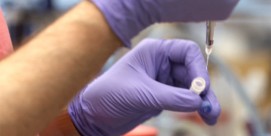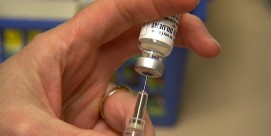In This Episode << SLIDE LEFT TO SEE ADDITIONAL SEGMENTS
Animal Testing Ethics
TIM O’BRIEN, guest anchor: Animal research has long been controversial. The medical benefits can be significant, although not always, and opponents argue the benefits are often outweighed by the pain and suffering inflicted on the animal. In California, there’s been an escalation in the conflict. In Santa Cruz last week, fire bombs were tossed at the home and car of two University of California researchers. Although no one was seriously hurt, city officials have posted a $30,000 reward for information leading to the arrest of those responsible — $2,500 of that contributed by the Humane Society of the U.S. Researchers at UCLA have also been targeted and federal officials say violence, and threats of violence, are up nationally. Saul Gonzalez has more on the story.
PAMELA FERDIN (Animal Rights Activist): Excuse me, can I give you a leaflet about the torture and murder of primates going inside the laboratories of UCLA?
SAUL GONZALEZ: On a recent afternoon, a group of activists gathered outside the University of California Los Angeles (UCLA) to protest the use of animals in laboratory research at the school.
Ms. FERDIN: It’s immoral. It’s unethical and evil to take non-consenting animals and, against their will, do these horrific things.
GONZALEZ: These demonstrators are peaceful, but in the last few years more militant animal rights activists have waged a campaign of harassment and intimidation against UCLA scientists involved in animal experimentation, such as using primates to investigate methamphetamine and nicotine addiction. The activists’ tactics have ranged from publishing researchers’ home addresses on Web sites to leaving threatening telephone messages.
VOICE OF UNIDENTIFIED MAN: Quit working on animals. Quit torturing and abusing animals. We can cause more economic damage in one night than you can earn in a year.
GONZALEZ: UCLA faculty members even have had pipe bombs planted at their homes. These episodes have created a climate of fear among researchers on campus.

John Hueston |
JOHN HUESTON (Attorney, UCLA): The point of boiling really began happening when people realized that they couldn’t live in their homes any longer and that they began having to check under their cars for bombs — that they could not leave their kids home alone at night for fear people would show up, pound on the doors, break things, maybe enter the house.
GONZALEZ: Federal law enforcement authorities say such incidents are on the rise nationally and reflect some activists’ increased willingness to use more extreme methods in their struggle to fight animal experimentation. UCLA, which declined our requests to shoot its research facilities, has successfully fought for a restraining order prohibiting animal rights activists from harassing researchers.
Nationally, a larger debate continues over the morality of using animals in laboratory experimentation, like these scenes captured by activists’ hidden cameras. Although exact numbers don’t exist, it’s believed millions of animals, from primates to pigs to rats, are used as test subjects in more than 1,000 laboratories in the United States.
Central to the controversy over the use of animals in scientific and medical research is this question: When, if ever, should the pain and discomfort inflicted on animals in laboratory experimentation outweigh the possible benefits the research might create for human beings?
Dr. JOHN YOUNG (Director, Comparative Medicine, Cedars-Sinai Medical Center, Los Angeles and Chairman, Americans for Medical Progress): The use of animals is a vital cornerstone to medical progress. and I would submit to you that if you would abolish the use of animals in medical research today, medical progress would slow, stop, and reverse.
GONZALEZ: Doctor John Young is director of comparative medicine at Los Angeles Cedars-Sinai Medical Center and chairman of Americans for Medical Progress, a pro-animal testing group. He says animal experimentation is vital to finding treatments for such illnesses as cancer, AIDS, Alzheimer’s, and heart disease in human beings.
Cedars-Sinai and Doctor Young gave us unusual access to facilities in the hospital where animals used in medical and scientific research are kept, such as these pigs used to test human heart implant devices.
Dr. YOUNG: The cardiovascular system of a pig is almost identical to that of a human being, okay. The coronary arteries, the heart muscle — virtually identical, so pigs are a favorite model for cardiovascular disease.
GONZALEZ: The human ramifications of this research would be what?
Dr. YOUNG: Improved care of cardiac patients.
GONZALEZ: But many animal rights groups say such research ignores the rights and interests of the test subjects.
UNIDENTIFIED WOMAN: It is my pleasure to introduce Professor Peter Singer.
GONZALEZ: Ethicist and writer Peter Singer is one of the founders of the modern animal rights movement. He believes that in the Western world religion has played a partial but key role in justifying humans’ exploitation of animals, including in scientific research.

Professor Peter Singer |
Dr. PETER SINGER (Ira W. DeCamp Professor of Bioethics, Center for Human Values, Princeton University): This idea that so much of our ethics flows out of that Judeo-Christian tradition which, of course, separates us from animals, puts this gulf between us, tells us that we alone were made in the image of God and they are not, that we have an immortal soul and they don’t. So it puts a sharp division between us, which, if we understand evolutionary theory correctly, there isn’t really that sharp division.
GONZALEZ: Although Singer says he supports very limited animal research that could lead to medical breakthroughs, he believes scientists and doctors too often conduct experiments that are unnecessary and ignore the distress inflicted on animals.
Dr. SINGER: Why is it that being a member of our species is morally important, is morally significant, whereas being a fellow sentient being, a fellow animal, if you like, why is that not important? And if it’s useful or beneficial or useful to us in some way to do something that might cause pain and suffering to the animal, that’s okay because they’re not members of our species? And I refer to this as “speciesism.” I think it is a parallel phenomenon, in some ways, to racism or sexism in just saying, “Well, we are the dominant group. We are the ones that matter and those outside beyond this boundary of our species just really don’t matter.”
Dr. YOUNG (showing off cancer mice in cages): So if you look under the skin of this mouse right here, that’s human prostate cancer.
GONZALEZ: Dr. Young says that researchers involved in animal experimentation take all possible precautions to reduce pain and suffering in their test subjects.
Dr. YOUNG: We watch these animals very, very closely, and when they begin to exhibit clinical signs indicating that the cancer is adversely affecting their health, we put them to sleep.
GONZALEZ: However, Doctor Young does argue that the benefits animal research creates for human beings should always be of paramount importance.

Dr. John Young |
Dr. YOUNG: People will ask me, how can you possibly do what you do? I can answer that question very easily. I walk them over to the pediatric cancer ward and show them children with bald heads with glioblastoma, brave children who will tell you, “I am terminal.” We are curing rats with the same disease at a 70 percent cure rate. I am excited about that. It would be immoral, in my opinion, not to have done what we’ve done in the rats.
GONZALEZ: But federal research institutions, such as the National Institutes of Health, have pledged to reduce the number of animals in laboratory testing. They’re exploring alternative research methods, such as experimenting on human cell cultures and using computer simulations to test treatments. But Peter Singer says efforts to remove animals from experimentation have been too slow and half-hearted in the scientific community.
Dr. SINGER: I think the whole institution is set up at the moment with a bias towards experimenting on animals and using them as subjects, because that’s what we have done for decades now.
GONZALEZ: As the controversy over animal research continues, so too does the debate over how human beings should balance their self-interest with their concern for the health and welfare of other living creatures.
For RELIGION & ETHICS NEWSWEEKLY, I’m Saul Gonzalez in Los Angeles.







